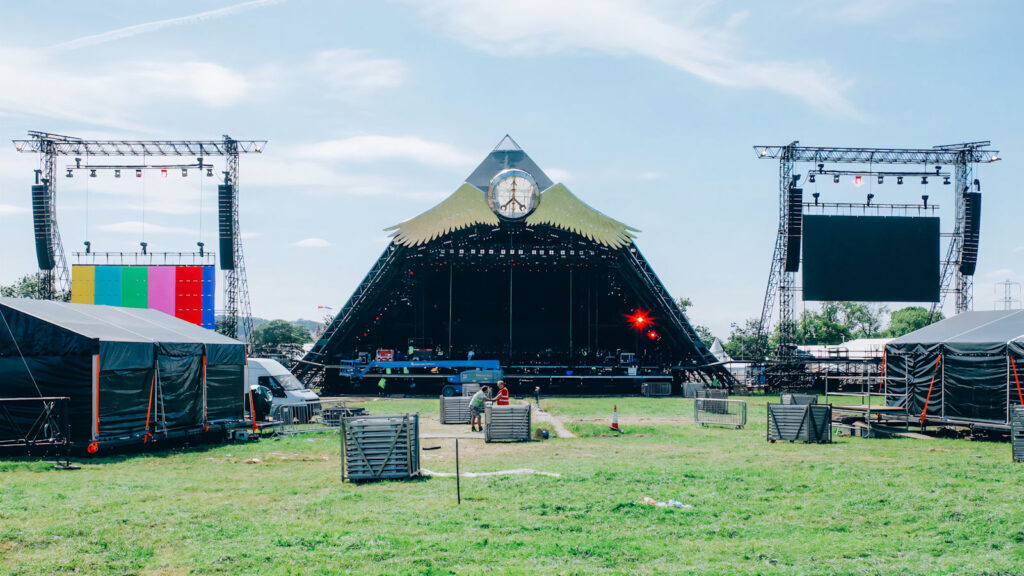Glastonbury Festival has a rich and storied history, dating back to its humble beginnings in 1970. The festival was originally organized by farmer Michael Eavis and his wife, Jean, on their land at Worthy Farm near Pilton, Somerset, England. It was inspired by the ethos of the 1960s counterculture movement and the famous Bath Festival of Blues and Progressive Music held in 1970.
The first edition of the festival then called the Pilton Pop, Blues & Folk Festival, took place on September 19, 1970. It featured an attendance of around 1,500 people and performances by artists such as Marc Bolan, Keith Christmas, and Al Stewart. The festival’s success led to its continuation, eventually evolving into the world-renowned Glastonbury Festival.
Over the years, Glastonbury Festival grew in scale and popularity, attracting larger audiences and expanding its lineup to include a wide range of musical genres. The festival gained international recognition as a prominent platform for both established and emerging artists, with iconic performances from artists like David Bowie, The Rolling Stones, Radiohead, Beyoncé, and many more.
The festival site itself is located in the idyllic countryside near the village of Pilton. It covers a sprawling area of farmland, offering space for multiple stages, performance areas, campsites, and infrastructure necessary to accommodate the massive attendance. The site’s layout is carefully designed to provide a memorable and immersive experience, with distinct areas such as the Pyramid Stage, Other Stage, West Holts, The Park, and the iconic Stone Circle.
Glastonbury Festival’s location in Somerset holds significant cultural and historical importance. The region is known for its mystical and spiritual associations, including the nearby town of Glastonbury, which has connections to Arthurian legends and ancient folklore. This proximity to ancient sites and mystical traditions adds an enchanting ambience to the festival.
Glastonbury Festival’s history and location have played pivotal roles in shaping its identity as a landmark event in the global music festival landscape. It has become a symbol of creativity, artistic expression, and a celebration of music and culture.
Music at Glastonbury
Glastonbury Festival is renowned for its diverse and eclectic lineup of musical performances, which span a wide range of genres and cater to a broad spectrum of musical tastes. Here are some key aspects of the festival’s music and performances:
Main Stages: The festival features several main stages that host headline acts and some of the most anticipated performances. The Pyramid Stage is the festival’s iconic centrepiece and showcases major artists from various genres, including rock, pop, and alternative music. Other notable stages include the Other Stage, West Holts Stage, The Park Stage, and John Peel Stage, each offering distinct programming and attracting different audiences.
Headliners and Main Acts: Glastonbury often secures high-profile headliners, who are globally recognized and highly sought-after artists. These headlining acts often include acclaimed bands, solo artists, and iconic musicians, who deliver memorable performances on the festival’s biggest stages. Past headliners have included legendary acts such as The Rolling Stones, Paul McCartney, Radiohead, Beyoncé, Arctic Monkeys, Florence + The Machine, and many more.
Emerging and Alternative Artists: In addition to the headline acts, Glastonbury is renowned for its support of emerging and alternative artists. The festival provides a platform for up-and-coming musicians and bands, offering them the opportunity to showcase their talent to a large and diverse audience. These performances can be found across various stages, including the smaller tents and stages that cater to specific genres and scenes.
Collaborative Performances: Glastonbury often features unique and unexpected collaborations between artists, resulting in special one-off performances that become highlights of the festival. These collaborations can take place on any of the stages, showcasing the creative energy and spontaneity that the festival fosters.
Non-Musical Performances: While music is at the heart of Glastonbury, the festival also incorporates non-musical performances into its programming. This includes spoken word performances, comedy acts, theatrical shows, circus performances, and interactive art installations. These diverse performances contribute to the festival’s multi-faceted and immersive experience.
Glastonbury Festival’s lineup and performances are carefully curated to offer a wide variety of musical genres, catering to different tastes and ensuring there is something for everyone. The festival’s commitment to showcasing both established and emerging artists contribute to its reputation as a trendsetter in the music industry, and its diverse programming allows attendees to discover new acts while enjoying performances from their favourite artists.

Glastonbury’s Cultural Significance
Glastonbury Festival holds significant cultural importance, both within the realm of music festivals and as a broader cultural event. Here are some aspects that contribute to its cultural significance:
Counterculture and Alternative Spirit: Glastonbury Festival emerged during the counterculture movement of the 1960s and early 1970s. It embodies the spirit of rebellion, free expression, and alternative lifestyles. The festival serves as a platform for individuals and communities to come together, celebrate their differences, and challenge societal norms.
Artistic Expression and Creativity: Glastonbury celebrates artistic expression in various forms, transcending music to encompass visual arts, installations, performance art, and more. The festival encourages artists and attendees to embrace their creativity, fostering an environment that nurtures and showcases diverse artistic endeavors.
Environmental Consciousness: Glastonbury Festival has been at the forefront of promoting environmental awareness and sustainability within the festival landscape. Its commitment to reducing waste, implementing eco-friendly practices, and championing environmental causes highlights the festival’s dedication to a greener and more sustainable future.
Inclusivity and Diversity: The festival prides itself on being inclusive and welcoming to people from all walks of life. It celebrates diversity in terms of musical genres, performers, attendees, and artistic expressions. Glastonbury strives to create a space where people can freely express themselves, embracing their individuality without judgment.
Charitable Endeavors: Glastonbury has a strong philanthropic focus, raising funds for various charitable causes. The festival has supported organizations and initiatives addressing social issues, humanitarian efforts, and environmental conservation. This commitment to giving back further enhances its cultural significance by using its platform to make a positive impact.
Historical Legacy: Glastonbury has a storied history, spanning over five decades. It has become an iconic event in the music festival landscape, known for its legendary performances, memorable moments, and cultural impact. The festival’s legacy contributes to its cultural significance, with each edition adding to its rich tapestry of musical and social history.
Glastonbury Festival’s cultural significance lies in its ability to transcend the realm of music, becoming a symbol of artistic freedom, social consciousness, and a celebration of human connection. It serves as a gathering point for like-minded individuals, fostering a sense of community and shared experiences that resonate with attendees long after the festival ends.
Glastonbury, Sustainability and Social Causes
Glastonbury Festival is known for its commitment to sustainability and support for social causes. The festival actively promotes environmental awareness, implements sustainable practices, and engages in philanthropic endeavors.
Environmental Sustainability: Glastonbury Festival strives to minimize its environmental impact by implementing various sustainability measures. These include waste management strategies, such as recycling and composting, reducing single-use plastics, and encouraging participants to adopt environmentally friendly practices. The festival has its own waste management and recycling system in place, and attendees are encouraged to actively participate in keeping the festival site clean and sustainable.
Energy and Carbon Footprint: Glastonbury aims to reduce its carbon footprint by employing renewable energy sources and promoting energy efficiency. The festival incorporates solar panels, wind turbines, and other sustainable energy solutions to power stages and infrastructure. Efforts are made to measure and minimize the festival’s overall energy consumption.
Environmental Campaigns and Education: Glastonbury Festival utilizes its platform to raise awareness about environmental issues and promote sustainable behaviors. It collaborates with various organizations and campaigns focused on environmental conservation and engages attendees through workshops, discussions, and educational initiatives that highlight the importance of sustainable living.
Social Causes and Charitable Partnerships: Glastonbury actively supports a range of social causes and charitable organizations. The festival has a long-standing tradition of fundraising for various causes, including human rights, social justice, and humanitarian efforts. Funds raised through ticket sales and other initiatives are often donated to these organizations, providing critical support for their work.
Green Initiatives and Sustainable Innovations: Glastonbury continually seeks innovative solutions to reduce its environmental impact. The festival pioneers green initiatives, such as the introduction of water refill stations, eco-cups, and sustainable food options. It collaborates with local suppliers and prioritizes ethical sourcing to support local communities and reduce its ecological footprint.
Through its sustainability and social initiatives, Glastonbury Festival aims to inspire positive change beyond the festival grounds. It encourages attendees to adopt more sustainable practices in their daily lives, raises awareness about social issues, and actively contributes to making a difference in the world.

Glastonbury Attendance and Tickets
Glastonbury Festival attracts a massive audience each year, with attendance numbers reaching hundreds of thousands of people. Due to its popularity, securing tickets for the festival can be quite challenging. Here’s more information about attendance and tickets:
Ticket Registration: To have a chance at purchasing tickets for Glastonbury Festival, individuals must register on the festival’s official website. Ticket registration typically opens several months in advance of the festival. The registration process involves providing personal details and a passport-sized photo. Registration does not guarantee a ticket but is a necessary step to be eligible for the ticket sale.
Ticket Sale: Glastonbury Festival operates on a ticket sale system. Once registration is complete, individuals are notified when tickets go on sale. Tickets are typically sold on a first-come, first-served basis. Due to the festival’s immense popularity, tickets often sell out quickly. It is not uncommon for tickets to be sold out within minutes of the sale opening.
Ticket Types: Glastonbury offers several ticket options to cater to different preferences and budgets. This includes standard weekend tickets, which grant access to the festival for the full duration, typically spanning several days. Additionally, there may be options for early entry tickets, campervan tickets, and hospitality packages for a more enhanced festival experience.
Resale Opportunities: In case individuals are unable to secure tickets during the initial sale, Glastonbury Festival operates a ticket resale process. This resale provides an additional opportunity to purchase any returned or canceled tickets. The resale usually takes place closer to the festival dates, offering a chance for those who missed out initially to still attend.
Official Ticket Outlets: Glastonbury Festival advises potential attendees to only purchase tickets through official outlets, such as the festival’s official website or authorized ticket agents. This helps to avoid scams and counterfeit tickets.




